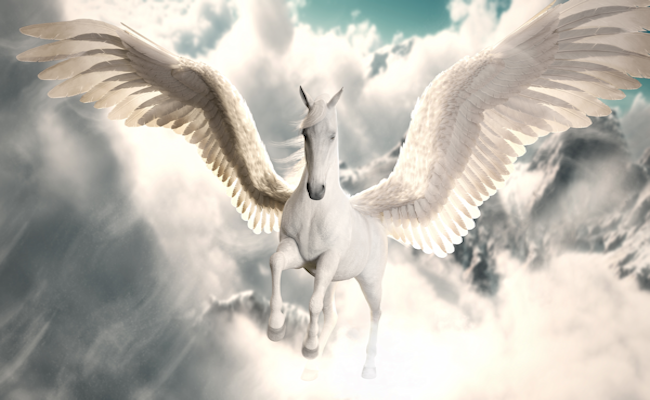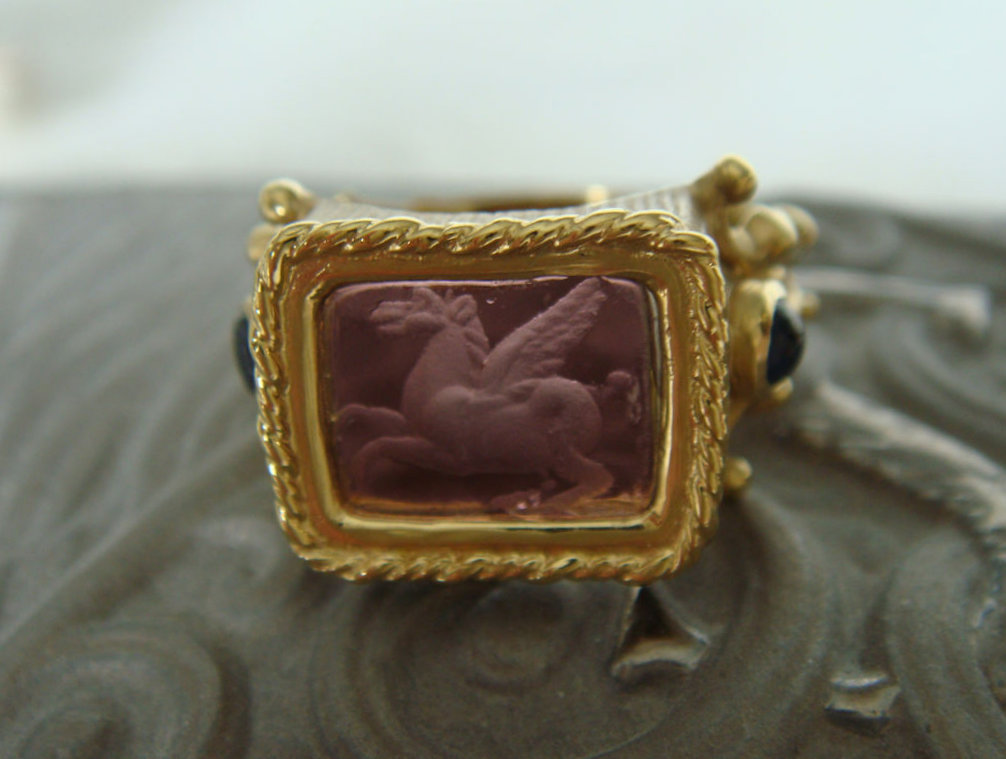Pegasus ~ Winged Symbol of Purity, Loyalty, Honor, and Bravery
Not only are the ancients well known for their gods and goddesses, but mythological creatures are another intriguing aspect of these cultures. One of the most ethereal of these creatures was Pegasus, a beautiful alabaster horse with angelic wings. Many companies today often present his image within their logos, as he often represents freedom and the wild, untamed beauty found in us all.
The irony of Pegasus, however, can be found in his origin story. According to ancient lore, Pegasus was actually the result of a love tryst between Neptune (Poseidon) and Medusa when she was still mortal. Upon being turned into a gorgon by Minerva (Athena), Medusa did not give birth traditionally to Pegasus and his twin brother, Chrysaor, until Perseus slew her, and the two of them suddenly sprung from her neck.
In certain depictions, Chrysaor has been shown as a wild winged boar, the foil of his brother. Other depictions have also shown him as a giant. Because his name roughly means “golden blade,” the most common depiction of him is often as a young warrior of great heart, carrying a golden sword. However, even his name is greatly contested, as some claim that it is a representation of the golden blades of wheat found in agriculture. Either way, little else is truly known about Chrysaor. It seems his story was destined to be overshadowed by the tumultuous story of his parents and the splendor of his brother.
As for Pegasus, his own set of ancient stories have been changed over time to entertain modern audiences. Often in film or cartoons he has been provided as a comedic foil to the ancient heroes and demigods, such as Hercules, or used as the primary means of transportation for characters such as Perseus. The latter is especially ironic, given the misdeeds of Perseus against Pegasus’s mother.
Despite the portrayal of Pegasus as a tamed horse, most of his original tale involved a life of freedom. He escaped Perseus immediately after his birth and flew through the skies unburdened. Though many tried to capture Pegasus, none had much success. His wild spirit was unobtainable.
What is it about such freedom that terrifies so many people? The freedom to love, the freedom to truly be oneself, the freedom to make one’s own choices? The ancient gods seem to be a mirror of these fears. Leave it to them, their jealous natures, and their need for constant control of others that often led to stopping such freedoms. In the case of Minerva, her own jealousy and hatred led to her continuous vendetta against Medusa. It heightened to such a point that she could not even let her grudge go when ushering in the new generation.
What did this mean for Pegasus? Well, Minerva simply could not have him flying freely through the skies, this gracious beauty that came from a person she had cursed. Oh no, she had to put a stop to that immediately. She saw her opportunity when Bellerophon came to her temple, praying to her for a way to free his village from another raging female creature, the Chimera, a creature that was part lion, goat, and serpent who also happened to be a fire-breather. In fairness, the Chimera was terrorizing the village by destroying cattle and men, yet there seems to be a consistent pattern on the side of Minerva in her approach to dealing with other women. Despite being the goddess of wisdom, Minerva rarely sided with her female contemporaries. Clearly the concept of women building up other women did not yet exist. Therefore, doing what she did best, she provided Bellerophon with the tools to eradicate his problem. Armed with a golden bridle and directions to the well Pegasus was known to drink from, Bellerophon was able to fly away with Pegasus to battle the Chimera and eventually slay her.
You would think that once his mission was over, he would give Pegasus his hard-earned freedom. Well, this is an ancient myth afterall. Bellerophon continued to utilize Pegasus’s abilities in further quests that spanned wars with the Amazons (a band of women warriors), Solymi warriors, and Carian pirates. Again, you would think that this service would be enough to satisfy the needs of Bellerophon, but he had an insatiable thirst for more. Feeling that all of his victories warranted a place among the gods, he attempted to ride Pegasus up Mount Olympus.
Determined to keep the status quo for mortals, Jupiter could not allow this. So instead of allowing the warrior into their paradise, he sent a fly to sting Pegasus and unseat Bellerophon. Thrown from his steed, Bellerophon was handed his fate to live out the rest of his days as a blind and severely injured mortal.
Pegasus was honored instead. Jupiter allowed him to fly between the mortal and immortal realms. He also designated him as his lightning bolt carrier. For both his bravery in battle and his loyalty to Jupiter, Pegasus was honored further by being placed in the night sky as a constellation.
The symbol of Pegasus often brings to mind a sign of purity, loyalty, honor, and bravery. Because of his ability to travel between the mortal and immortal realms, people often see him as a representation of the soul. Even poets have been known to call upon his image as a muse for their own inspiration. You may choose to wear this icon to represent your undeniable free spirit or as a reminder to persevere through hard trials.
Tagliamonte Venetian cameo jewelry represents an artistry from a bygone era filled with gods and goddesses, heroes and heroines, and the epic battle of good versus evil. The 14K Tagliamonte ring below features a unique hand carved intaglio representing Pegasus in his glory. Wear this ring and feel your spirit soar!
- Created on .
- Hits: 779


